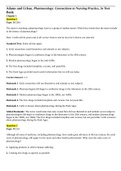Exam (elaborations)
Test Bank For Pharmacology- Connections to Nursing Practice 3rd Edition by Michael Patrick Adams, Carol Urban Test Bank(All CHAPTERS COMPLETE, 100% CORRECT)
- Course
- Institution
- Book
Test Bank For Pharmacology- Connections to Nursing Practice 3rd Edition by Michael Patrick Adams, Carol Urban Test Bank est Bank For Pharmacology- Connections to Nursing Practice 3rd Edition by Michael Patrick Adams, Carol Urban Test Bank Adams and Urban, Pharmacology: Connections to Nursing Prac...
[Show more]



